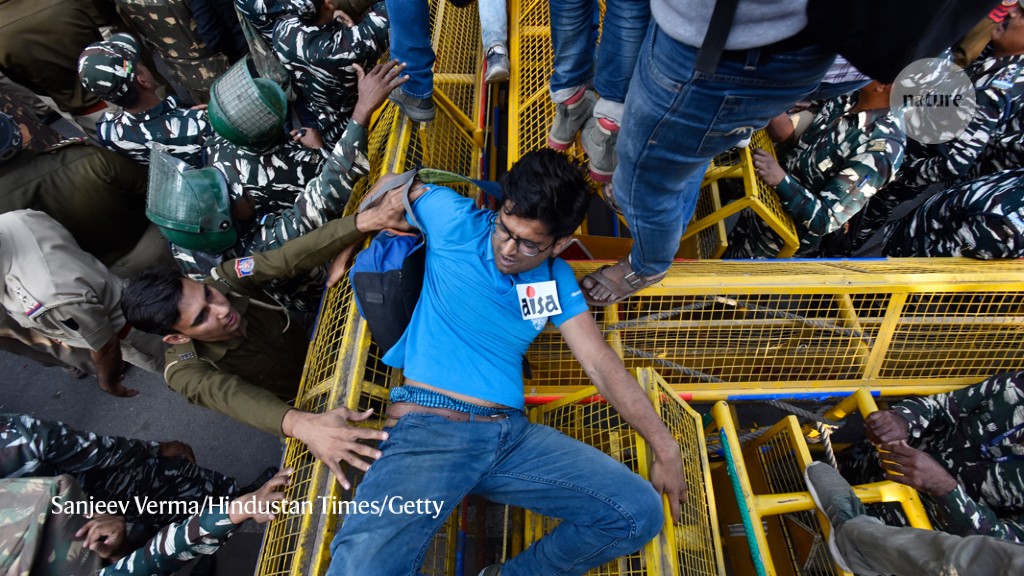Report details hundreds of violent attacks, sackings and imprisonments of academics and students in the past year.

Indian authorities respond to students protests at Jawaharlal Nehru University in New Delhi in November.Credit: Sanjeev Verma/Hindustan Times/Getty
Attacks on higher-education communities have become a troubling global phenomenon that shows no sign of abating, according to a report published on 19 November.
The annual analysis — compiled by Scholars at Risk, an international advocacy network based at New York University — tracks incidents that violate the academic freedom or human rights of scholars or students. This year’s report documented 324 verified attacks in 56 countries from September 2018 to the end of August 2019 (see ‘Threatened freedom’).
The incidents are reported to Scholars at Risk by volunteers. They include violent or fatal attacks on scholars and students, wrongful prosecution or imprisonment, and sacking or expulsion from institutions.
Other qualifying attacks include travel restrictions that affect academics, such as the ban on citizens of certain Muslim-majority nations entering the United States, and systemic issues including university closures or military occupation of campuses.

Source: Free to Think (Scholars at Risk, 2019)
This year’s figure is up on the 294 incidents in 47 countries reported in 2018 — but the authors caution that their analyses capture only a snapshot of the situation because many more attacks are likely to go unreported.
Global problem
The report details incidents in countries that have strong higher-education and research systems, such as the United States and the United Kingdom. In one UK case, ten student activists were temporarily denied access to their university during a visit by members of the royal family, and were unable to participate in classes or take exams.
But many of the most serious attacks occurred in countries struggling to develop effective academic communities. In five nations, reported attacks surged, the analysis notes.
India has seen frequent violent clashes between students and other groups on university campuses over a variety of issues including corruption and sexual harassment; these are often violently suppressed by police. Clashes in ideology also prompted incidents: the report recorded several academics and students who were sacked or expelled from their institutions because they expressed views that their universities did not share.
In the past year, Sudan has seen major crackdowns by police and paramilitary-organizations on political protests at higher-education institutions amid turmoil that toppled the country’s long-time dictator. This led to the temporary shutdown of many universities. The report also notes spikes in attacks on scholars and students in China and Brazil.
The fifth featured country is Turkey, where, since 2016, thousands of academics have been dismissed, prosecuted, imprisoned or forbidden from travelling for expressing views inimical to the government, or for allegedly being affiliated with groups that the government opposes. But here the report sounds a rare note of optimism. In July, the country’s highest court ruled that the conviction of ten academics for signing a petition calling for peace in predominantly Kurdish regions of Turkey violated constitutional rights to freedom of expression. The court ordered retrials, sparking hope that other convictions will be overturned or dropped.
The report comes as academic institutions in Hong Kong deal with violent clashes sparked by anti-government protests.
doi: 10.1038/d41586-019-03582-5
